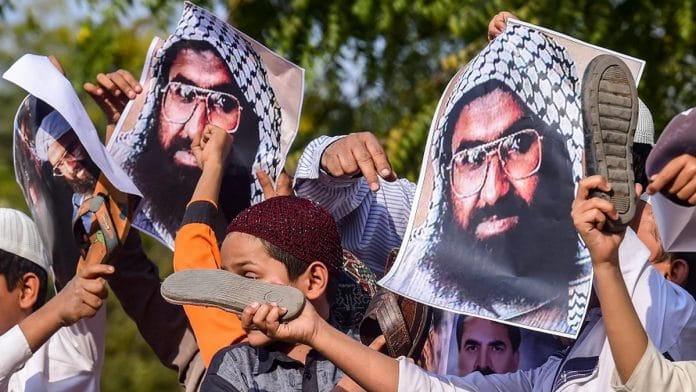New Delhi: The absence of any reference to the Pulwama terror attack in the United Nations Security Council (UNSC) notification designating Jaish-e-Mohammed (JeM) chief Masood Azhar a ‘global terrorist’ was part of India’s strategy to finally get him on the list, a government official told ThePrint.
According to the official, New Delhi deliberately refrained from making the 14 February Pulwama attack a factor in discussions with China on Azhar’s listing in a bid to make it easier for Beijing to withdraw its hold on the latest sanctions proposal without losing face with key ally Pakistan.
The proposal was moved by France, the US, and the UK two weeks after the attack.
The Pakistan-based JeM claimed responsibility for the Pulwama terror attack that killed 40 CRPF personnel, but Islamabad, which claims India has not presented evidence to support the outfit’s hand in the strike, wanted any discussions on UN sanctions against Azhar delinked with the bloodbath.
Also read: China says issue of listing Masood Azhar a terrorist will be ‘properly resolved’
‘Noted in black & white’
According to the source, as the cat-and-mouse negotiations over Azhar’s listing as a global terrorist unfolded over the last two-and-half months, China sought to turn up the heat on India in early March by proposing a visit by vice-foreign minister Kong Xuanyou along with a stop at Pakistan.
Through this, Beijing ostensibly wanted to broker a deal between the two neighbours as tensions soared in the aftermath of Pulwama.
But New Delhi held firm and turned down the Chinese request, the source added, because it did not want to appear to be negotiating with Beijing on the Pulwama attacks.
Syed Akbaruddin, India’s permanent representative to the UN in New York, told ThePrint over the phone that the reason there was no mention of Pulwama in Wednesday’s UNSC sanctions committee listing was because the Pulwama link with the JeM had already been noted in black and white in the US-led 21 February press statement.
The statement cited by Akbaruddin categorically said the JeM had taken responsibility for the Pulwam attack. There was no further need for this to be reiterated in follow-up negotiations with the Chinese, Akbaruddin added.
“All negotiations pre-suppose bargaining. We had already pocketed the Pulwama-JeM linkage in February, following give-and-take then,” he added. “So it was no longer part of our strategy. If we had put Pulwama back on the table, other countries may have tried to claw it [the sanctions proposal] back,” Akbaruddin said.
“Once we pocket a victory, we need not put it back on the negotiating table. That is not prudent,” he added.
‘China felt isolated’
However, the official source admitted that the key to persuading China to drop its objections to the Azhar listing was the threat held out by the US, that it would take the matter from the closed-door 1267 sanctions committee to the open UN Security Council forum.
“This persuaded China that it would be isolated if it didn’t agree,” the source said. As many as 14 countries, including many in India’s neighbourhood like Bangladesh, the Maldives, and Bhutan, had added their voice to support for the JeM chief’s designation as a global terrorist. This changed the whole conversation.”
In the give-and-take over the last few weeks, the US also gave in by allowing the Chinese to take another week to withdraw its objections — the US had wanted 23 April as the deadline, while the Chinese had wanted to wait till much later in May. Azhar was eventually listed on 1 May.
Another key reason that pressed China to relent was the submission of Azhar’s audio tapes by Foreign Secretary Vijay Gokhale to Chinese Ambassador Luo Zhaohui in Delhi by India’s Ambassador to China Vikram Misri, and, subsequently, to all the representatives of the Permanent-Five countries in New York.
Akbaruddin pointed out that one week after the Pulwama attack, the aforementioned US-led press statement at the UN General Assembly reaffirmed India’s condemnation of the strike. Sometime in mid-March, the audio tapes of Azhar “spewing venom against India” were submitted as supporting evidence that the man needed to be blacklisted globally.
This “revised material” acted as evidence to convince the Chinese that the JeM was, indeed, active and alive in Pakistan and needed to be proceeded against.
The Chinese said in a statement Wednesday that it took the decision to lift its technical hold in view of “revised material” that was shared with Beijing. It also applauded Pakistan’s role in acting against terrorism.
With his name now in the UN 1267 Sanctions Committee list, Azhar will face a travel ban, assets freeze and arms embargo. According to Ministry of External Affairs Spokesperson Raveesh Kumar, the UN has said it will monitor that Pakistan implements all these restrictions.







That photograph shows how Muslims in India feel constrained to walk an extra mile to prove their patriotism.